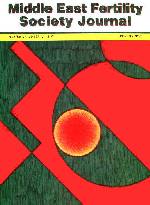
|
Middle East Fertility Society Journal
Middle East Fertility Society
ISSN: 1110-5690
Vol. 9, Num. 1, 2004, pp. 1-2
|
Middle East Fertility Society Journal, Vol. 9, No. 1, 2004, pp. 1-2
EDITORIAL
On
the necessity of monitoring ART
Karl Nygren for the International Committee on
the Monitoring of ART (ICMART)
ICMART members are:
Karl Nygren, chairman,
David Adamson
Paul Lancaster
Jacques de Mouzon
Elizabeth Sullivan
Fernando Zegers-Hochschild.
Code Number: mf04001
Current data on the
safety and efficacy of ART, from many parts of the world including the Middle East, provide convincing
evidence of the necessity to understand clearly and to follow continuously the
outcomes of ART activities.
Why is this necessary?
Because without a
continuous surveillance, confidence in ART will be eroded and undermined. ART
does have, still, safety problems and risks that need to be described and
evaluated so that current clinical policies and laboratory procedures can be
revised, if necessary. ART is, still, controversial to some, mainly because
uncertainly about its safety. Confidence in ART is needed for the couples to be
treated but also for the professionals who provide the treatment and for
society at large, for legislators and resource allocators.
It would, in fact, be
very unwise and counter-productive and indeed unethical not to monitor the safety and efficacy of ART.
Both aspects need to be
covered, both efficacy and safety, because success and treatment benefits rely
on both factors and on a reasonable balance between them. Also, an evaluation
against cost and time should be included.
The data collection
techniques for ART monitoring differs between efficacy indicators and most of
the safety indicators. Resources for data collection differs in different
settings. For efficacy assessment the creation of an IVF register, collecting
data from the IVF clinics in the area, is a workable option.
Many countries have such
IVF registers already today while other countries are in the process of setting
up such registers.
The perhaps most
important indicator for the safety of IVF-children, which is the incidence of
multiple pregnancy and delivery, can also be covered by an IVF register,
whereas other safety indicators, like cerebral palsy and other medical
conditions which are not always evident at birth, cannot be collected by an IVF
register collecting data only from the IVF clinics themselves. Typically, many
IVF clinics actually lose track of their pregnant patients after the first
trimester. Therefore, for several safety indicators, population based health
registers which exist in some countries can be used for cross linkage. Examples
include birth-registers, cancer-registers, malformation-registers and more. In
countries lacking such registers, specific research projects are needed for the
follow-up of the IVF-children.
These difficulties do
not give reason, however, not to start off with an IVF register with data
collected from the IVF clinics.
For the protection of
their own operations, many clinics no not want to disclose their results
openly. Clinics compete with "success-rates", which typically do not
give the whole story. Therefore, many registers present data without
identifying the different clinics. This is acceptable at present but in the
long run openness is a better choice. Again, the reason is confidence building
and maintenance. Secrecy leads to suspicion.
Ideally, each clinic
should report their data only once to their National or their Regional register,
which then reports to the ICMART for the World Report.
Ideally, all clinics
should use the same forms and the same definitions of terminology.
Following an ICMART/WHO
workshop in Cairo in October of 2003, a
Middle East IVF Register was established, hopefully with full coverage of the
area and with full international cooperation and participation. Dr. Ragaa
Mansour from Cairo was elected to run the
register.
This is a very important
and significant and indeed necessary step for building and maintaining
confidence in ART.
Copyright © Middle East Fertility Society
| 